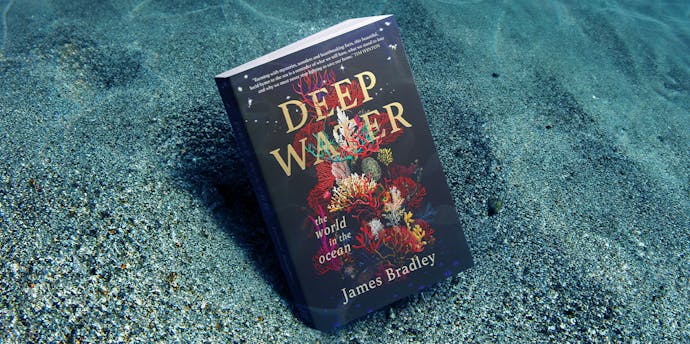Review: Deep Water, James Bradley, Penguin
Beaches in the Cocos Islands are smothered in thousands of tonnes of plastic waste; the currents of the Indian Ocean sweep across the southern end of India and south-east Asia bringing the plastic to the islands. Hermit crabs are enticed by the larger plastic liquid containers and climb inside, but the plastic walls are slippery, and they get stuck. This is bad enough for an individual crab, but when the crab dies it releases a pheromone that signals to other crabs that the ‘shell’ is now available. So, more crabs come, climb in and die, the containers filling with dozens of dead crabs.
This plastic eventually breaks down, entering the ocean and the food chain as microplastics. Other effects are not so obvious and studied but are surmised. In this rich liminal zone, the plastic ‘film’ on the beaches heats the sand by up to ten degrees, possibly killing off much of the small animal life under the sand and affecting the food chain.
These are just a couple of the issues facing the oceans. We are discovering that despite their vastness, they, like the atmosphere to which they are linked, are not impervious to human activities. The title of James Bradley’s book can be used metaphorically, of course, to indicate deep trouble, and while he ends the book on a note of hope, the litany of pelagic perils is frightening.
There is a ‘swimming ape’ theory, somewhat fringe albeit, that suggests that once humans settled along the coasts, swimming and diving drove human evolution. Oceans allowed trade and exploration. (He notes also that as civilisations developed, Europeans and Chinese lost their love of swimming – something that may be connected to a lack of awareness of what civilisations have done to oceans.) Bradley describes his love of the ocean, of floating in its immensity, of a primal and sublime feeling, but it’s also something of an alien place, at times foreboding, blank and timeless. Except that it can change, sometimes at alarming rates. In palaeontological history, the collapse of reefs proceeded rapidly, preceding other mass extinctions. The decline of Antarctic glaciers is happening quicker than expected.
Coral reefs are an obvious indicator of oceanic health. In a mass bleaching event in 1997-98, 25% per cent of the world’s coral was affected. There are dire warnings about the Great Barrier Reef. Some see no future for it, and there are some scientists who describe multiple bleaching events as trauma. Some see short-term disaster followed by longer-term adaptation, as has often been the case across geological history. But as that might happen on this geological timescale, our grandkids might not be able to visit a reef that looks like it does today. There are plenty of ideas about saving the reef, such as taking corals that display more resistance to higher temperatures and seeding them across the reef, but the reef’s sheer size, which would initially seem to count for its resilience, is an impediment to blanket solutions.
Indulge me further in some depressing news, if you will. The oceans are being over-fished, a legacy of post-WWII industrial-scale fishing. In many places fish stocks are down by 95 percent. The biggest culprit is China, whose territorial waters are virtually empty, and whose fleets roam the world. They engage in unofficial warfare for control of other countries’ waters, harvesting fish from international waters, leaving nearby territorial waters affected because, of course, fish don’t respect such human-made borders. Unsurprisingly, illegal and underreported fishing benefits wealthy nations. In places like the coasts of Africa, local fishermen are forced to feed their families through illegal and under-sized fishing. Another legacy is the Somali pirate phenomenon, started when Indian fishers encroached on Somali fisheries, forcing the fishermen to change occupations. Such issues highlight the fact that ecology and morality are inseparable.
As with the primeval forests, perhaps the oceans just seemed too big to be affected by puny us. As with the forests, colonialists saw unlimited resources, which were ravaged in surprisingly short time-spans. In the 1800s, 90% of Australia’s oyster beds were wiped out, in places like Botany Bay and Moreton Bay. A hundred years ago, fishermen described virtual rivers of fish in the Atlantic, and streams teeming with salmon. There were huge schools of 400kg tuna in the North Sea. The descriptions defy belief, another example of shifting baseline syndrome, where the current dearth of marine life is seen as normal.
The ocean is a vast system, or set of systems. At night, the diel vertical migration sees millions of creatures rising from the depths, from the twilight zone where light is one percent or less of the light at the surface, encouraging currents. This movement regulates heat and cycles nutrients through the ocean. Everything is in motion in the ocean, like the atmosphere. If the atmosphere is an ocean of air, the ocean is an atmosphere of water. In the seemingly nightmarish twilit deep-sea zone, there is a store of creatures that can populate and diversify the upper layers if need-be; Bradley describes natural selection working faster here – counterintuitively, more so than in the tropics, where conditions are fruitful, and species rarely go extinct. In the deep sea, in contrast, there are species ready to adapt – this may be needed as human-induced changes threaten the species closer to the light.

Human beings have imposed their own systems on the ocean – Bradley visits the massive port of Rotterdam, where, he says, the industry of capital may seem inevitable and unstoppable, but it is neither. We must give way; either we direct our own symbiosis with the oceans, or Earth’s systems crash down upon us. Hope for the oceans and ourselves lies in us reducing our own destructive systems and then letting the ever-moving oceans to cycle through and begin the long process of repair.
Nick Mattiske blogs on books at coburgreviewofbooks.wordpress.com and is the illustrator of Thoughts That Feel So Big.












